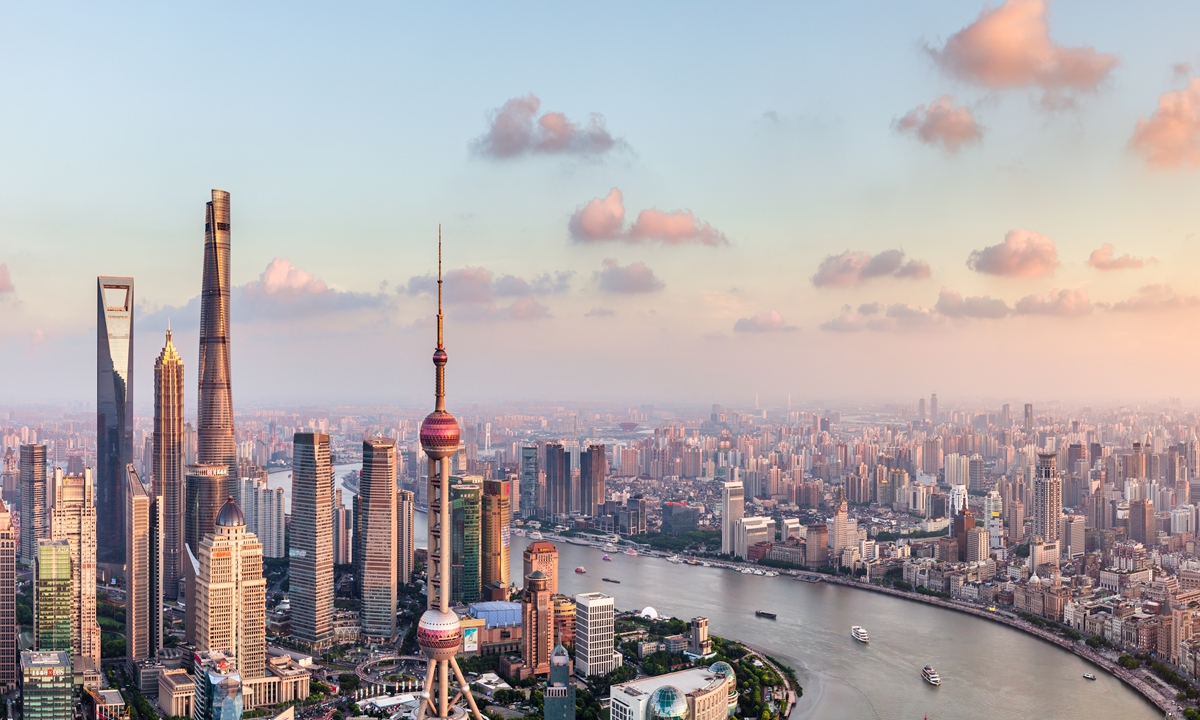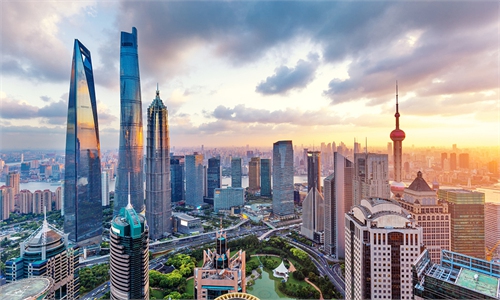China’s actualized FDI continues double-digit gains in Jan-Oct, in latest sign of magnetic attraction for overseas capital

A view of Shanghai Photo: VCG
China's actual use of foreign investment continued to attain double-digit gains in the first 10 months of the year, data from the Ministry of Commerce (MOFCOM) showed on Thursday, in a fresh sign of the country's sustained magnetic appeal for overseas capital despite global headwinds.
Behind the impressive numbers - a praise-worthy achievement amid geopolitical tensions, a languishing global economy and the continued fallout from the pandemic - are China's known prowess in manufacturing, its favorable business environment, and other institutional strengths, experts said.
As the country remains a firm advocate for globalization and inclusive growth, its allure for international capital - especially by pragmatic investors - is set to be firmly on the rise, they noted, betting on China's optimized approach to handling the coronavirus to attract foreign investment inflows.
In the first 10 months, actualized foreign direct investment (FDI) totaled $168.34 billion, an increase of 17.4 percent year-on-year, MOFCOM spokesperson Shu Jueting told a regular press conference.
A breakdown of the FDI numbers revealed that South Korea's actual investment in China soared 106.2 percent. The amount of FDI from Germany rose by 95.8 percent, that from the UK went up 40.1 percent and that from Japan was 36.8 percent higher.
As measured by domestic regions, eastern China recorded a 12.4 percent increase in the actual use of FDI, per MOFCOM data, with 33.6 percent for central China and 26.9 percent for western China.
The figures for the first 10 months speak volumes about the resilience and continued attractiveness of the Chinese market for overseas capital, Cao Heping, an economist at Peking University, told the Global Times on Thursday.
Capital is inherently in pursuit of a secure, friendly and fast-growing place and China best fits the description, Cao said.
Behind the admirable numbers is China's unparalleled position as the only country in the world with all the industrial categories listed in the UN industrial classification. This, adding to its top-notch business environment, sound infrastructure, stable political, economic and social environment renders the Chinese market an eagerly pursued destination for foreign investment, Dong Dengxin, director of the Finance and Securities Institute at the Wuhan University of Science and Technology, told the Global Times on Thursday.
In the words of Cao, the internet-based shared economy being underpinned by China's digital technologies has gained steam over the past few years, resulting in an economic transition and a shift in capital investment toward high-tech areas.
The rebalancing toward tech-driven growth ratchets up the country's long-term allure for investment-wise foreign capital, he said.
On top of that, the country has vigorously pushed for globalization and international partnerships, as exemplified by the rapid development of the Belt and Road Initiative, Dong said, stressing that some voices within some countries that attempt to politicize economic issues would by no means reverse the megatrend of cooperation.
That South Korea and Germany stood out from the rest of the international community in looking to the Chinese market for growth opportunities points to the two countries' strength in advanced manufacturing, making them hugely complementary with the Chinese market, Dong noted.
In a recent sign of ever-closer economic ties between China and Germany, Chinese Premier Li Keqiang and visiting German Chancellor Olaf Scholz jointly met with representatives of the Chinese and German business communities in Beijing earlier in November.
Businesses of the two countries enjoy longstanding cooperation, and bilateral economic and trade ties have long been deeply integrated. Severing the ties and decoupling are simply impossible, Li said, according to the Xinhua News Agency.
Factoring in the country's recently announced optimization of its virus prevention and containment measures, the double-digit FDI gains are expected to continue and may increase, economists said.
China's push for an optimized COVID-19 response is in line with new developments in viral containment will enable a better environment for economic and trade investment which bodes well for more foreign investment inflows, Dong said.
The Standing Committee of the Political Bureau of the Communist Party of China Central Committee met last week to hear a report on the COVID-19 response, and discussed and arranged 20 measures for optimizing virus prevention and control. The meeting said that anti-virus measures shouldn't be relaxed, but a "one-size-fits-all" approach ought to be avoided.

